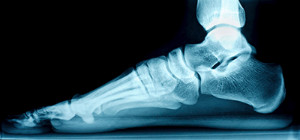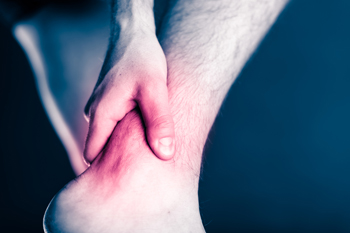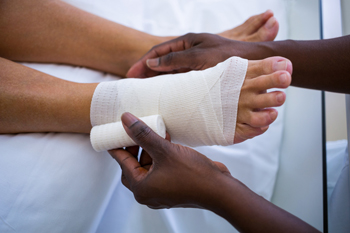Items filtered by date: October 2020
Do I Have Flexible or Rigid Flat Feet?
 Flat feet is a condition in which the arch, the curved middle part of the bottom of the foot, is absent or has collapsed. The lack of an arch causes the entire sole of the foot to make direct contact with the ground when walking or standing. There are actually two types of flat feet that differ slightly from one another. Flexible flat feet have the ability to form an arch, but this arch flattens when any weight is put on the foot. However, the arch is visible when you are sitting down or holding your foot up in the air. This is the most common type of flat foot. Rigid flat feet cannot form an arch, regardless of whether or not weight is placed on them. While most cases of flat foot do not require medical intervention, sometimes this condition can cause pain or discomfort. In those cases, it is recommended that you see a podiatrist for treatment.
Flat feet is a condition in which the arch, the curved middle part of the bottom of the foot, is absent or has collapsed. The lack of an arch causes the entire sole of the foot to make direct contact with the ground when walking or standing. There are actually two types of flat feet that differ slightly from one another. Flexible flat feet have the ability to form an arch, but this arch flattens when any weight is put on the foot. However, the arch is visible when you are sitting down or holding your foot up in the air. This is the most common type of flat foot. Rigid flat feet cannot form an arch, regardless of whether or not weight is placed on them. While most cases of flat foot do not require medical intervention, sometimes this condition can cause pain or discomfort. In those cases, it is recommended that you see a podiatrist for treatment.
Flatfoot is a condition many people suffer from. If you have flat feet, contact Matthew McQuaid, DPM from Lake Mendocino Podiatry. Our doctor will treat your foot and ankle needs.
What Are Flat Feet?
Flatfoot is a condition in which the arch of the foot is depressed and the sole of the foot is almost completely in contact with the ground. About 20-30% of the population generally has flat feet because their arches never formed during growth.
Conditions & Problems:
Having flat feet makes it difficult to run or walk because of the stress placed on the ankles.
Alignment – The general alignment of your legs can be disrupted, because the ankles move inward which can cause major discomfort.
Knees – If you have complications with your knees, flat feet can be a contributor to arthritis in that area.
Symptoms
- Pain around the heel or arch area
- Trouble standing on the tip toe
- Swelling around the inside of the ankle
- Flat look to one or both feet
- Having your shoes feel uneven when worn
Treatment
If you are experiencing pain and stress on the foot you may weaken the posterior tibial tendon, which runs around the inside of the ankle.
If you have any questions please feel free to contact our offices located in Lakeport and Ukiah, CA . We offer the newest diagnostic and treatment technologies for all your foot and ankle needs.
Possible Reasons for Ankle Pain
 Patients who have experienced ankle pain are aware of the inconvenience this can cause. Daily activities can be difficult to accomplish, and mobility may be limited. There are several reasons why ankle pain may develop. These can include Achilles tendonitis, the arthritic condition that is known as gout, and ankle sprains or fractures. Some of the symptoms that are associated with ankle pain can include swelling, and it may be difficult to bend the ankle. If you are afflicted with any type of ankle pain that is from an injury or medical condition, it is suggested that you seek the counsel of a podiatrist.
Patients who have experienced ankle pain are aware of the inconvenience this can cause. Daily activities can be difficult to accomplish, and mobility may be limited. There are several reasons why ankle pain may develop. These can include Achilles tendonitis, the arthritic condition that is known as gout, and ankle sprains or fractures. Some of the symptoms that are associated with ankle pain can include swelling, and it may be difficult to bend the ankle. If you are afflicted with any type of ankle pain that is from an injury or medical condition, it is suggested that you seek the counsel of a podiatrist.
Ankle pain can be caused by a number of problems and may be potentially serious. If you have ankle pain, consult with Matthew McQuaid, DPM from Lake Mendocino Podiatry. Our doctor will assess your condition and provide you with quality foot and ankle treatment.
Ankle pain is any condition that causes pain in the ankle. Due to the fact that the ankle consists of tendons, muscles, bones, and ligaments, ankle pain can come from a number of different conditions.
Causes
The most common causes of ankle pain include:
- Types of arthritis (rheumatoid, osteoarthritis, and gout)
- Ankle sprains
- Broken ankles
- Achilles tendinitis
- Achilles tendon rupture
- Stress fractures
- Bursitis
- Tarsal tunnel syndrome
- Plantar fasciitis
Symptoms
Symptoms of ankle injury vary based upon the condition. Pain may include general pain and discomfort, swelling, aching, redness, bruising, burning or stabbing sensations, and/or loss of sensation.
Diagnosis
Due to the wide variety of potential causes of ankle pain, podiatrists will utilize a number of different methods to properly diagnose ankle pain. This can include asking for personal and family medical histories and of any recent injuries. Further diagnosis may include sensation tests, a physical examination, and potentially x-rays or other imaging tests.
Treatment
Just as the range of causes varies widely, so do treatments. Some more common treatments are rest, ice packs, keeping pressure off the foot, orthotics and braces, medication for inflammation and pain, and surgery.
If you have any questions, please feel free to contact our offices located in Lakeport and Ukiah, CA . We offer the newest diagnostic and treatment technologies for all your foot care needs.
Slow Healing Diabetic Wounds
 Diabetes is a condition that can require professional assistance in maintaining the health of the feet for those affected. It can be common for those with diabetes to develop foot ulcers. These are slow healing, deep wounds, that if left untreated, can become badly infected. Infections can lead to serious complications, and in severe cases, may require amputation. Diabetes can often affect the nerves in the feet, causing them to lose feeling, which is why many patients let their wounds go untreated. To help prevent wounds from getting infected, please consult with a podiatrist for regular screenings.
Diabetes is a condition that can require professional assistance in maintaining the health of the feet for those affected. It can be common for those with diabetes to develop foot ulcers. These are slow healing, deep wounds, that if left untreated, can become badly infected. Infections can lead to serious complications, and in severe cases, may require amputation. Diabetes can often affect the nerves in the feet, causing them to lose feeling, which is why many patients let their wounds go untreated. To help prevent wounds from getting infected, please consult with a podiatrist for regular screenings.
Wound care is an important part in dealing with diabetes. If you have diabetes and a foot wound or would like more information about wound care for diabetics, consult with Matthew McQuaid, DPM from Lake Mendocino Podiatry. Our doctor will assess your condition and provide you with quality foot and ankle treatment.
What Is Wound Care?
Wound care is the practice of taking proper care of a wound. This can range from the smallest to the largest of wounds. While everyone can benefit from proper wound care, it is much more important for diabetics. Diabetics often suffer from poor blood circulation which causes wounds to heal much slower than they would in a non-diabetic.
What Is the Importance of Wound Care?
While it may not seem apparent with small ulcers on the foot, for diabetics, any size ulcer can become infected. Diabetics often also suffer from neuropathy, or nerve loss. This means they might not even feel when they have an ulcer on their foot. If the wound becomes severely infected, amputation may be necessary. Therefore, it is of the upmost importance to properly care for any and all foot wounds.
How to Care for Wounds
The best way to care for foot wounds is to prevent them. For diabetics, this means daily inspections of the feet for any signs of abnormalities or ulcers. It is also recommended to see a podiatrist several times a year for a foot inspection. If you do have an ulcer, run the wound under water to clear dirt from the wound; then apply antibiotic ointment to the wound and cover with a bandage. Bandages should be changed daily and keeping pressure off the wound is smart. It is advised to see a podiatrist, who can keep an eye on it.
If you have any questions, please feel free to contact our offices located in Lakeport and Ukiah, CA . We offer the newest diagnostic and treatment technologies for all your foot care needs.
Why Live with Pain and Numbness in Your Feet?
Different Forms of Neuropathy
 Research has indicated that many patients who have neuropathy may be diabetic. Peripheral neuropathy is defined as nerve damage that can affect the feet, and can happen from elevated glucose levels in the blood. It can cause the inability to feel sensation, and there may be muscle weakness and slowed reflexes. Patients who have autonomic neuropathy may experience difficulty in swallowing, or have abnormal blood pressures and heart rates. Damage that is inflicted on the hips, thighs, or legs may be indicative of radiculoplexus neuropathy, and this may be linked to diabetes. An additional form of neuropathy is referred to as mononeuropathy, and this may cause difficulty in focusing the eyes. If you are experiencing weakness or a lack of sensation in your feet, it is strongly suggested that you are under the care of a podiatrist.
Research has indicated that many patients who have neuropathy may be diabetic. Peripheral neuropathy is defined as nerve damage that can affect the feet, and can happen from elevated glucose levels in the blood. It can cause the inability to feel sensation, and there may be muscle weakness and slowed reflexes. Patients who have autonomic neuropathy may experience difficulty in swallowing, or have abnormal blood pressures and heart rates. Damage that is inflicted on the hips, thighs, or legs may be indicative of radiculoplexus neuropathy, and this may be linked to diabetes. An additional form of neuropathy is referred to as mononeuropathy, and this may cause difficulty in focusing the eyes. If you are experiencing weakness or a lack of sensation in your feet, it is strongly suggested that you are under the care of a podiatrist.
Neuropathy
Neuropathy can be a potentially serious condition, especially if it is left undiagnosed. If you have any concerns that you may be experiencing nerve loss in your feet, consult with Matthew McQuaid, DPM from Lake Mendocino Podiatry. Our doctor will assess your condition and provide you with quality foot and ankle treatment for neuropathy.
What Is Neuropathy?
Neuropathy is a condition that leads to damage to the nerves in the body. Peripheral neuropathy, or neuropathy that affects your peripheral nervous system, usually occurs in the feet. Neuropathy can be triggered by a number of different causes. Such causes include diabetes, infections, cancers, disorders, and toxic substances.
Symptoms of Neuropathy Include:
- Numbness
- Sensation loss
- Prickling and tingling sensations
- Throbbing, freezing, burning pains
- Muscle weakness
Those with diabetes are at serious risk due to being unable to feel an ulcer on their feet. Diabetics usually also suffer from poor blood circulation. This can lead to the wound not healing, infections occurring, and the limb may have to be amputated.
Treatment
To treat neuropathy in the foot, podiatrists will first diagnose the cause of the neuropathy. Figuring out the underlying cause of the neuropathy will allow the podiatrist to prescribe the best treatment, whether it be caused by diabetes, toxic substance exposure, infection, etc. If the nerve has not died, then it’s possible that sensation may be able to return to the foot.
Pain medication may be issued for pain. Electrical nerve stimulation can be used to stimulate nerves. If the neuropathy is caused from pressure on the nerves, then surgery may be necessary.
If you have any questions, please feel free to contact our offices located in Lakeport and Ukiah, CA . We offer the newest diagnostic and treatment technologies for all your foot care needs.

